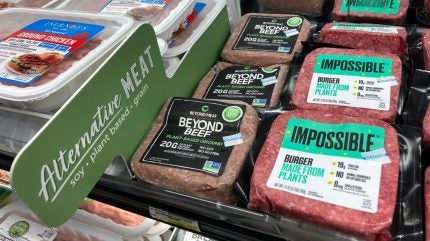
The “reframing” of “alternatives” to conventional fare is expected to be among the key trends in the food industry this year, according to research from GlobalData, Just Food’s parent.
Alternatives include products like dairy alternatives, plant-based meat, beanless coffee and cocoa-free chocolate.

Discover B2B Marketing That Performs
Combine business intelligence and editorial excellence to reach engaged professionals across 36 leading media platforms.
In the ‘Top Trends to Watch in 2025’ webinar hosted by the group’s Consumer division, senior analyst Hannah Cleland noted that alternatives, “are an extremely difficult concept to market due to consumer reservations around taste and other aspects”.
Taste specifically was “the top barrier” highlighted by GlobalData surveys in all FMCG categories.
The plant-based meat markets of the US and in certain European countries have seen growth slow amid consumer concerns about taste and price.
One way to reframe alternatives is by focusing on pushing the nutritional benefits of the product to consumers, said Cleland.

US Tariffs are shifting - will you react or anticipate?
Don’t let policy changes catch you off guard. Stay proactive with real-time data and expert analysis.
By GlobalData“If we’re to realign consumers’ expectations of taste, added health benefits are an alternative way to convey a superior product or an additional motivation to buy the alternative.”
The focus on promoting added health benefits is a growing focus in plant-based meat specifically. Last year, UK-based group This announced plans to develop new higher protein whole food ingredients-based products in a bid to counter growing criticism on ultra-processed foods.
Speaking to Just Food last year, This R&D director Luke Byrne said: “I fully truly believe that plant-based nutrients as they are today will get cleaner… We will clean up that area.”
He added: “I think the biggest thing is about consumer education. We need to find ways to communicate what we’re doing and what we’re trying to do to get them on the journey to keep the category going, to keep [it] growing for the future.”
Away from plant-based meat, Cleland cited the example of Nukoko, a UK-based start-up that has developed an alternative to chocolate using fava beans. She said the product “gives them a competitive health advantage over standard chocolate products”.
Businesses should consider reframing their approach to marketing alternatives, added Cleland, by positioning products as a sustainable option for consumers but not “making unrealistic claims about being the only solution”.
“Honesty will be a refreshing policy in 2025. However, brands should not play down the positive attributes that give alternatives a competitive advantage in specific areas such as naturalness, health and sustainability.”
Mental wellness
Other consumer trends expected to come to the fore in 2025, according to GlobalData, include “mood maintenance”.
According to analyst Alice Popple-Connelly, consumers are looking for “healthier ways to optimise areas of mental wellness, such as cognitive function and emotional support” using functional ingredients like adaptogens and nootropics.
As growing numbers of consumers develop “a heightened awareness of their mental health”, functional ingredients that can improve mood or relax are being seen by brands “as a way to elevate otherwise ordinary products and engage new generations of consumers”.
While the trend provides a “real opportunity for brands”, Popple-Connelly added that “consumer expectations of product performance need to be managed in order to avoid scepticism”.
Tariff threats
The impact of possible tariffs this year, following US President-elect Donald Trump’s entry into office in January, such as that between the US and China, will also remain a hot topic for “sensitive categories” like food and drink, said Popple-Connelly.
While Trump has proposed a 60% blanket tariff on Chinese imports, in late 2024 he also outlined plans to impose a 25% tariff on imports from Mexico and Canada.
“Leveraging a domestic subsidiary to a global brand can be one way to earn consumer trust in 2025 and beyond,” said Popple-Connelly. “The geopolitical landscape will oblige supply chains to cope with such demands while keeping in mind that global trade with contingency plans is still beneficial.”
“2025 undeniably holds many certainties for industry, many uncertainties for industry and consumers, which means that care must be taken over ambassador and business partnerships, ensuring that conflict of view and narratives is impossible.”





